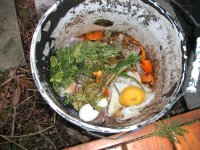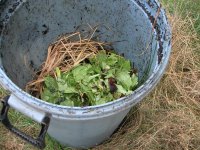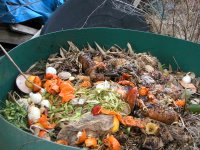Cooking for the earth
How is that for a title that smacks of grandiosity and touchy-feely seventies back-to-earth movements? 

 Perhaps its having been raised in Seattle, and surrounded by so much majestic and sublime scenery that I take a few extra steps in not just protecting our environment but nurturing it. Or perhaps its because I seek out penance for the millions of square feet of good earth that I have helped develop and pave into more retail space and parking lots. Or perhaps its because I enjoy the substantial savings on my garbage and water/sewer bill when I recycle and compost.
Perhaps its having been raised in Seattle, and surrounded by so much majestic and sublime scenery that I take a few extra steps in not just protecting our environment but nurturing it. Or perhaps its because I seek out penance for the millions of square feet of good earth that I have helped develop and pave into more retail space and parking lots. Or perhaps its because I enjoy the substantial savings on my garbage and water/sewer bill when I recycle and compost.
Either way, my old housemate, Joe, got the household into some heavy composting. But when I moved into my own house, composting wasn't happening fast enough--probably because it wasn't the proper mixture of green (grass clippings, kitchen produce scraps) and brown (raked leaves). As my neighbors will testily attest I neither mow my grass nor rake my leaves.
Anyway, I solved the matter by making a worm bin. These little guys chew through everything, fast. In just a few months they'll turn the veggie scraps, burnt croutons, espresso pods, forgotten and now sprouting potatoes, etc into the rich, dark organic compost matter known as humus, soil's "life force". (Do not put meat or pet/human secretions into your bin--it will attract vermin, smell, and it is just gross. Chicken and rabbit coop clean up seems to be ok.) When Dale and his rabbits move in, we'll dump their hutch droppings in as well. I have even begun to throw my cardboard Ben and Jerry's lids into the mix, reserving the container itself for grease. In fact, Seattle's sanitation department now picks up food and yard waster separately, and you can throw food-stained cardboard containers into the bins.
Composting itself is very simple. I have even seen it done well in apartment units with a porch or fire escape and condominiums. A worm bin is much simpler and smaller than a compost bin. Get a plastic garbage can, drill air and drainage holes, throw in your kitchen produce waste, a bag of earthworms, some liquid, and replace the top. Make sure that it stays moist, but not sopping. I keep a slop bucket (top left) by my porch into which I'll occasionally pour pasta water, coffee-pot clean up, and salad-cleaning water. this will get dumped into the bin along with the vegetable matter that has accumulated over the week. During the rainy season--oh, wait this is Seattle--I'll leave the lid partially off. But the bigger bin (top right) just looks too nasty to leave the lid off, and it leaves a lot to be desired as a landscaping feature.
I'd say the life of a worm in an compost bin safe from predators, all the food you could want, and of course, lots of asexual reproduction--must be pretty sweet.


 Perhaps its having been raised in Seattle, and surrounded by so much majestic and sublime scenery that I take a few extra steps in not just protecting our environment but nurturing it. Or perhaps its because I seek out penance for the millions of square feet of good earth that I have helped develop and pave into more retail space and parking lots. Or perhaps its because I enjoy the substantial savings on my garbage and water/sewer bill when I recycle and compost.
Perhaps its having been raised in Seattle, and surrounded by so much majestic and sublime scenery that I take a few extra steps in not just protecting our environment but nurturing it. Or perhaps its because I seek out penance for the millions of square feet of good earth that I have helped develop and pave into more retail space and parking lots. Or perhaps its because I enjoy the substantial savings on my garbage and water/sewer bill when I recycle and compost.Either way, my old housemate, Joe, got the household into some heavy composting. But when I moved into my own house, composting wasn't happening fast enough--probably because it wasn't the proper mixture of green (grass clippings, kitchen produce scraps) and brown (raked leaves). As my neighbors will testily attest I neither mow my grass nor rake my leaves.
Anyway, I solved the matter by making a worm bin. These little guys chew through everything, fast. In just a few months they'll turn the veggie scraps, burnt croutons, espresso pods, forgotten and now sprouting potatoes, etc into the rich, dark organic compost matter known as humus, soil's "life force". (Do not put meat or pet/human secretions into your bin--it will attract vermin, smell, and it is just gross. Chicken and rabbit coop clean up seems to be ok.) When Dale and his rabbits move in, we'll dump their hutch droppings in as well. I have even begun to throw my cardboard Ben and Jerry's lids into the mix, reserving the container itself for grease. In fact, Seattle's sanitation department now picks up food and yard waster separately, and you can throw food-stained cardboard containers into the bins.
Composting itself is very simple. I have even seen it done well in apartment units with a porch or fire escape and condominiums. A worm bin is much simpler and smaller than a compost bin. Get a plastic garbage can, drill air and drainage holes, throw in your kitchen produce waste, a bag of earthworms, some liquid, and replace the top. Make sure that it stays moist, but not sopping. I keep a slop bucket (top left) by my porch into which I'll occasionally pour pasta water, coffee-pot clean up, and salad-cleaning water. this will get dumped into the bin along with the vegetable matter that has accumulated over the week. During the rainy season--oh, wait this is Seattle--I'll leave the lid partially off. But the bigger bin (top right) just looks too nasty to leave the lid off, and it leaves a lot to be desired as a landscaping feature.
I'd say the life of a worm in an compost bin safe from predators, all the food you could want, and of course, lots of asexual reproduction--must be pretty sweet.


0 Comments:
Post a Comment
<< Home